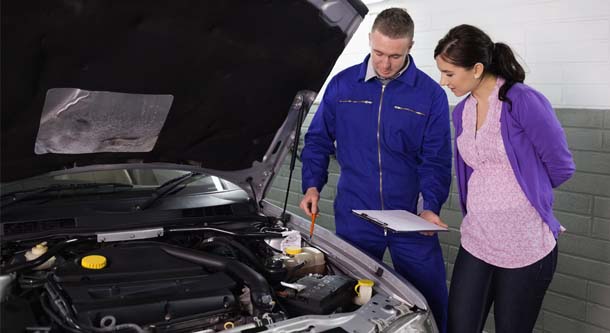
If you ask any automotive technician what the hardest part of their job is, the word “diag” will often come up. That’s short for “diagnosing”—yep, just like at the doctor’s office. When we get a car in that has a problem but the customer has very little information to provide about the issue, our process of diagnosing feels like trying to solve a mystery. So, just like when you go to the doctor for a health issue, it helps to provide as much information as you can to help us diagnose the issue with your vehicle. One of the worst things a car owner can say is, “My car makes a squeaky sound.” That leaves us with many questions and nowhere to start: When is the squeaking happening? Where do you hear it? How often?
To avoid this kind of confusion, here are some guidelines for how you can describe your car’s problem to your mechanic:
-
Be as descriptive as you can. Use words like “vibration,” “metal-to-metal,” “grinding,” or “whirring.” The more specific and descriptive you can be, the better. Now is a great time to break out your old thesaurus and put it to good use!
-
Track when the problem happens. Before you bring your car in, take note of when the problem occurs. Is it while accelerating, braking, turning? Is it while parking, going uphill, coasting downhill? Does it happen when it’s hot out, cold out, or perhaps raining? Take a mental note of these conditions and let your mechanic know.
-
Detail how often the problem happens. Does it happen every time you park (or accelerate, decelerate, etc.)? Is it every once in a while? Maybe every time you do (fill in the blank)? This is good for us to know.
-
Take note of where in the car it’s happening. Do you hear a noise closer to the front of the car, the back, the side, or somewhere else? Can you hear it when your windows are up or only when the windows are down? The location on the car gives us a huge step towards finding the source of the issue.
As you can imagine, it makes diagnosing your car’s problem a whole lot easier when we have information to go on. It will also make it faster for us to get to the source of the problem, which means you’ll get your car back even sooner.
Something that occurs more often than you think is that a customer will bring in his or her family member’s car and won’t know what the problem is. So if you’re bringing in your spouse’s or teenager’s car, try to find out as much as you can from them first. Ask them how, what, when, where questions until you feel that you have enough to communicate to your automotive technician.
If you don’t have many answers, that’s okay. Any information helps more than no information. For your automotive needs, Ward Automotive in Bel Air would be happy to get to the bottom of your car issue. We gladly service all of Harford County and can even handle your body shop needs with our Bel Air Autobody shop.
{{cta(‘f09f0ec9-2e53-4c1c-aac8-64ac82bfd6f1’)}}
